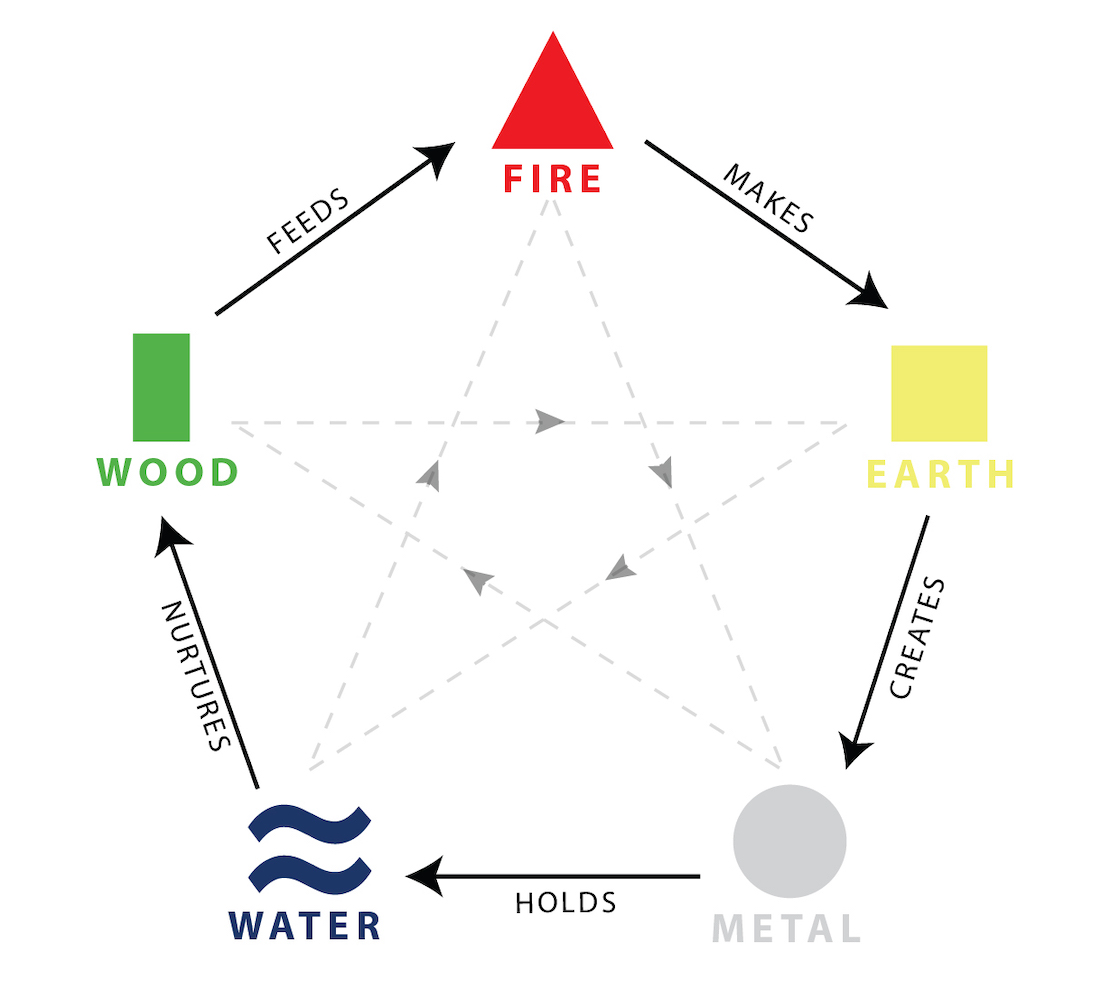Chinese people believe that we are surrounded by five energy fields or five different kinds of “Qì” (气). These are also called the “five elements“ and they play an important role in all aspects of Chinese culture, including the way people eat. This theory states that if these five elements are changed or moved, this could seriously affect a person’s fate.
The “five elements” (五行) are also known as the five agents, five phases, five movements, five forces, five processes, and five planets.
If the concept of yīn and yáng is the center of the Chinese culture, then the theory of the “five elements” should be treated as its cornerstone.

The Five Elements Theory
The five elements are metal (金), wood (木), water (水), fire (火), and earth (土). Chinese people use this five elements theory for a lot of things, from the interaction between internal organs to politics, and Chinese medicine to cooking and food.
It’s just like finding the perfect balance yīn and yáng, it’s about trying to find the perfect balance between the five elements. There are two main relationships between these five elements. One is called “mutual generation (相生)” and the other one is called “mutual overcoming (相克).”
Examples of mutual generating:
- Wood made Fire stronger.
- Fire made Earth (ash).
- Earth contained and bore Metal.
- Metal improved the quality of the Water.
- Water helps the Wood grow.
Example of mutual overcoming:
- Earth can stop Water.
- Water can stop a Fire.
- Fire can melt Metal.
- Metal can cut Wood.
- Wood can consume Earth.
To give an example from nature, a plant (wood) grows when it is given water. When burnt, wood gives birth to fire, and the burnt ashes subsequently return to the earth.
Fēngshuǐ Associations
| Wood | Fire | Earth | Metal | Water | |
|---|---|---|---|---|---|
| Direction | East | South | Center | West | North |
| Season | Spring | Summer | change of seasons (last month of each season) | Autumn | Winter |
| Climate | Windy | Hot | Damp | Dry | Cold |
| Color | Green | Red | Yellow | White | Black |
| Shape | Rectangular | Angular | Square | Round | Undulating |
Astrology Associations
| Wood | Fire | Earth | Metal | Water | |
|---|---|---|---|---|---|
| Planets | Jupiter | Mars | Saturn | Venus | Mercury |
| Heavenly Creatures | Azure Dragon (青龙) | Vermilion Bird (朱雀) | Yellow Dragon (黄龙) | White Tiger (白虎) | Black Tortoise (玄武) |
| Heavenly Stems | 1st (Jiǎ 甲), 2nd (Yǐ 乙) | 3rd (Bǐng 丙), 4th (Dīng 丁) | 5th (Wù 戊), 6th (Jǐ 己) | 7th (Gēng 庚), 8th (Xīn 辛) | 9th (Rén 壬), 10th (Guǐ 癸) |
| Virtue | Benevolence | Propriety | Fidelity/ Honesty | Righteousness | Wisdom |
| Represents | Creativity, luxuriance, blooming, and flourishing | Enthusiasm and passion | Nurturing, stability, and security | Ambition, determination, progress, and persistence | Aptitude, brightness, agile mind, and mental strength |
Other Associations
| Wood | Fire | Earth | Metal | Water | |
|---|---|---|---|---|---|
| Taste | Sour | Bitter | Sweet | Spicy | Salty |
| Sensory Organs | Eyes | Tongue | Mouth | Nose | Ear |
| Zodiac Sign | Tiger, Rabbit | Snake, Horse | Ox, Dragon, Goat, Dog | Monkey, Rooster | Pig, Rat |
Etymology
Xíng (行) of wǔxíng (五行) means moving; a planet is called a ‘moving star’ (行星 xíngxīng) in Chinese. Wǔxíng originally refers to the five major planets (Jupiter, Saturn, Mercury, Mars, Venus) that create five dimensions of earth life. Wǔxíng is also widely translated as “Five Elements” and this is used extensively by many including practitioners of Five Element acupuncture. The Chinese xíng (行) are “primarily concerned with process and change,” hence the common translation as “phases” or “agents”. By the same token, Mù (木) is thought of as “Tree” rather than “Wood”. The word element is thus used within the context of Chinese medicine with a different meaning to its usual meaning.
It should be recognized that the word phase, although commonly preferred, is not perfect. Phase is a better translation for the five seasons (五運 wǔyùn) mentioned below, and so agents or processes might be preferred for the primary term xíng. Manfred Porkert attempts to resolve this by using Evolutive Phase for 五行 wǔxíng and Circuit Phase for 五運 wǔyùn, but these terms are unwieldy.
Within Chinese medicine texts the wǔxíng are also referred to as wǔyùn (五運) or a combination of the two characters (五行運 wǔxíngyùn) these emphasise the correspondence of five elements to five ‘seasons’ (four seasons plus one). Another tradition refers to the wǔxíng as wǔdé (五德), the Five Virtues.
| 木 | 金 | 土 | 日 | 月 | 火 | 水 | |
|---|---|---|---|---|---|---|---|
| 东方青龙 | 角木蛟 | 亢金龙 | 氐土貉 | 房日兔 | 心月狐 | 尾火虎 | 箕水豹 |
| 北方玄武 | 斗木獬 | 牛金牛 | 女土蝠 | 虚日鼠 | 危月燕 | 室火猪 | 壁水貐 |
| 西方白虎 | 奎木狼 | 娄金狗 | 胃土雉 | 昴日鸡 | 毕月乌 | 觜火猴 | 参水猿 |
| 南方朱雀 | 井木犴 | 鬼金羊 | 柳土獐 | 星日马 | 张月鹿 | 翼火蛇 | 轸水蚓 |